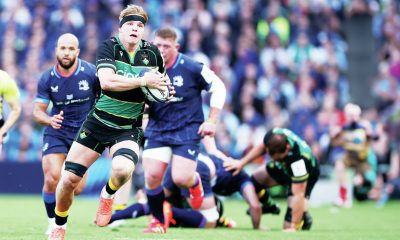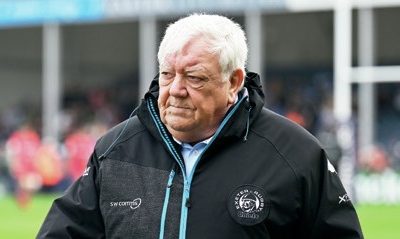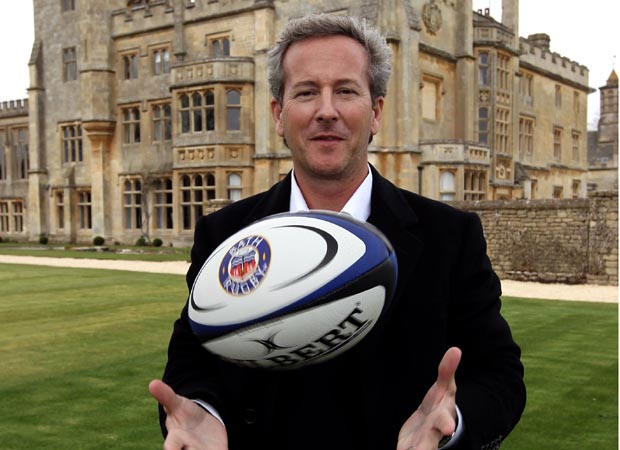 If the English clubs want clout when it comes to the future of the European Cup, as in bargaining power, then this is a season in which one of their six contenders winning the tournament is non-negotiable. The potential schism over the Premiership’s decision to sell their own European television match rights to BT Vision has led to bad blood with the Celts and Italians – and Harlequins, Northampton, Leicester, Saracens, or outsiders Exeter and Sale, winning the Heineken-sponsored trophy again would allow the English clubs to prosecute their argument for change from a position of strength.
If the English clubs want clout when it comes to the future of the European Cup, as in bargaining power, then this is a season in which one of their six contenders winning the tournament is non-negotiable. The potential schism over the Premiership’s decision to sell their own European television match rights to BT Vision has led to bad blood with the Celts and Italians – and Harlequins, Northampton, Leicester, Saracens, or outsiders Exeter and Sale, winning the Heineken-sponsored trophy again would allow the English clubs to prosecute their argument for change from a position of strength.
Another Irish win, with the holders, Leinster, attempting to match the Toulouse record of four titles, would put the boot on the Celtic foot. There are those who would argue that what happens on the field does not have an undue affect on what happens in rugby’s administrative boardrooms, but the evidence in Rugby Union of winners on the pitch also being winners in terms of influence off it, is overwhelming.
Ireland drew level with England in terms of European Cup titles won with Leinster’s second successive triumph last season, becoming joint leaders with their clubs/provinces recording six wins each. The English roster starts with Bath (1998) and continues with Northampton (2000), Leicester (2001, 2002), and Wasps (2004, 2007). The Irish record is Ulster (1999) – a season in which the English clubs withdrew from the tournament – and then Munster (2006, 2008), and Leinster (2009, 2011, 2012).
The French are next in the success stakes with five titles, while the Welsh, Scots and Italians have yet to break their duck despite the competition about to start its 18th edition.
However, the stark reality is that although the Premiership clubs have contested two finals since Lawrence Dallaglio’s Wasps beat Leicester 25-9 in 2007’s all-English final at Twickenham, they have not won the trophy since then, and their thunder has been well and truly stolen by the Irish. It is true that Leicester (2009) and Northampton (2010) have come close, but neither could have any complaints at being edged out by Leinster in both finals.
Five years between sups is a long wait for the English clubs, whose boast that they play in the toughest domestic league in the world has had an increasingly hollow ring to it. The French would take issue with that claim in any case, and certainly in terms of purchasing power and squad strength-in-depth, the Top 14 is in a league of its own.
The French are also in a league of their own when it comes to playing all sides off against the middle in the battle to decide the shape of the European Cup when the current TV rights agreement ends in 2014. So, the English – who had counted on the unequivocal support of the French, but have yet to receive it – have every reason to want one of their own captains to lift the trophy in Dublin eight months from now, rather than have the French, let alone the Celts, gazump them.
Delivering for England amid this background of political upheaval falls foremost on the shoulders of the Premiership champions, Harlequins, although Northampton, Saracens and Leicester can also be considered as strong runners in the hunt for European glory.
It can also be argued that there is a significant Anglo interest to the French challenge in this season’s campaign, with Jonny Wilkinson, Andrew Sheridan, and the Armitage brothers, Steffon and Delon, intrinsic to Toulon’s drive to deliver a trophy for the Mediterranean club’s ‘Mr. Moneybags’, Mourad Boudjellal.
The right to be the English standard bearers in the European Cup has passed from Leicester to Harlequins, and the changing of the banner guard was re-emphasised a fortnight ago when the Londoners won a convincing victory at Welford Road. On that occasion they made their own luck by meeting Leicester head-on in the forwards and nicking the only try of the match – thanks to a Nick Evans half-break resulting in Tom Williams running clear – but they were also blessed with a dollop of outright good fortune by landing in the weakest group of the lot when the Pool draw was announced in June.
Harlequins and Biarritz are the only other heavy hitters in Pool 3. The other two contestants, Connacht and Zebre, encapsulate the grievances the English clubs have about battling tooth and nail for a European Cup place by achieving a top six finish in an unrelenting league like the Premiership, while two sides from the Pro12 qualify with lowly credentials. In Connacht’s instance it was an eighth place finish, and in the case of Zebre, who are Aironi by another name, it was twelfth.
The flip side of the coin is that unless Harlequins blow it as spectacularly as they did when they lost 9-8 to Connacht at the Showgound last season – forfeiting a place in the last eight despite Gloucester doing them the huge favour of beating Toulouse – then this time a home quarter-final should be within reach.
Biarritz are a realistic impediment to that aim, with the kicking of Dimitri Yachvili, and the inspirational qualities of English flanker Magnus Lund and USA wing Takudzwa Ngwenya, not to be underestimated.
The other impediment is more structural. The defeat in the west of Ireland raised question marks over whether Quins have the squad depth to fight successfully on two fronts – and they remain unresolved. Harlequins are rightly proud of the steady stream of impressive English youngsters produced by their academy system, and it persuaded Conor O’Shea to make only a couple of low profile summer signings, with hooker Dave Ward (Cornish Pirates) and utility back Ben Botica added to the roll-call.
The failure to strengthen the squad further was perplexing, and, with back three strike runners Tom Williams and Ross Chisholm sidelined against the Tigers, injuries could start to undermine Quins.
The one player that Harlequins cannot afford to lose to injury is Evans, because the former All Black fly-half is so intrinsic to the team’s tempo and direction. Given that Evans’ understudy, Rory Clegg, has so much less experience and recent game-time it would be unrealistic to ask him to orchestrate with the same incisiveness and guile, but that does not allay the suspicion that Quins would be much less effective in attack without the Kiwi.
It is also almost inevitable that at some stage Quins will have to delve into their forward reserves, and the ability of the likes of lock Charlie Matthews, flanker Luke Wallace and tight head Kyle Sinckler to deputise will be crucial. In many ways this European campaign is a test of the template Harlequins have established, bringing through home-grown and, initially at least, relatively low cost English players, compared with sides like Leicester and Northampton who have more overseas signings.
Whether Leicester (Pool 2), and Northampton (Pool 5), can finally get their hands back on the trophy will depend on whether they can improve significantly on last season when the East Midlands rivals were both dumped out in the pool stage after juddering defeats, with the Tigers routed by Ulster at Ravenhill (41-7), and Northampton outplayed at Milton Keynes by Munster (51-36).
If Leicester emerge ahead from their tussle with Toulouse, the Ospreys and Treviso – which is a virtual Italian test side – to clinch a place in the last eight, they will defy the doubters who believe that they lack the bludgeoning forward power, or a sharp enough backline blade, to cut it in the knock-out stage. The Tigers visit to Toulouse in the first round will tell us whether they are capable of squeezing out one of those gold-dust away wins, or whether Toby Flood can create chances without being reliant on Ben Youngs constantly providing a threat on his inside.
Northampton have a less fraught opening assignment at home to Glasgow, but while the Scots, and the French side, Castres, have no great European record, both are difficult propositions on their home grounds. However, the real test of the physicality of Courtney Lawes, Samu Manoa, Saone Tonga’uhia and Tom Wood up front, and the finishing skills of newcomers like Luther Burrell, the Pisi brothers, and full-back James Wilson, will be in their consecutive meetings with Ulster in December.
Having been ousted by Munster last season the Saints will not want another Irish side to get the better of them, and the only way to travel to Ravenhill is with an emphatic victory in the first leg at Franklin’s Gardens in the bag.
The road does not get any easier for Saracens, who understand how big the next step is having been beaten 22-3 by Clermont in their home quarter-final last season. They have to find a way of getting ahead of Munster, Edinburgh and Racing Metro in Pool 1, and to do so they will have to score tries as well as kick penalties. Their win last weekend over Harlequins suggests that Sarries, and Owen Farrell, will travel to Murrayfield with confidence – but they had better be ready for a higher tempo game than they play in the Premiership because Edinburgh will try to run them ragged. Negotiate that and Schalk Brits and company get to take on Munster back-to-back in a mid pool tussle which could prove decisive.
Elsewhere you can rely on Exeter coach Rob Baxter to make sure that the Chiefs are no easy-beats in Pool 5 – this year’s ‘pool of death’ – and his Leinster counterpart, Joe Schmidt, has said he expects the English newcomers to be a tough nut to crack at Sandy Park.
The Chiefs have drawn the short straw with the champions, Clermont, and the Scarlets to contend with, and if they get out of the pool it will be another remarkable achievement for the Devon club.
As for Sale, given their current difficulties at the foot of the Premiership it seems like a pig-flying exercise to suggest that they can mount any sort of challenge to Toulon, Cardiff Blues, and Montpellier, but they have most of the same squad that finished sixth in the league last season. That means Sale should be good enough not to be the Pool 6 doormats.
However, what the English desperately need is a club not just capable of stopping the slide, but restoring some of the kudos that the Premiership has lost in the past five years. Harlequins are best placed to do that. They have momentum, a favourable draw, and a deep desire to to be champions of Europe – now all they have to do is keep their main men fit.


Latest News
Super Rugby Americas: Round Ten Review

British and Irish Lions
British and Irish Lions: Biggest winners and losers from Andy Farrell’s selection

























You must be logged in to post a comment Login